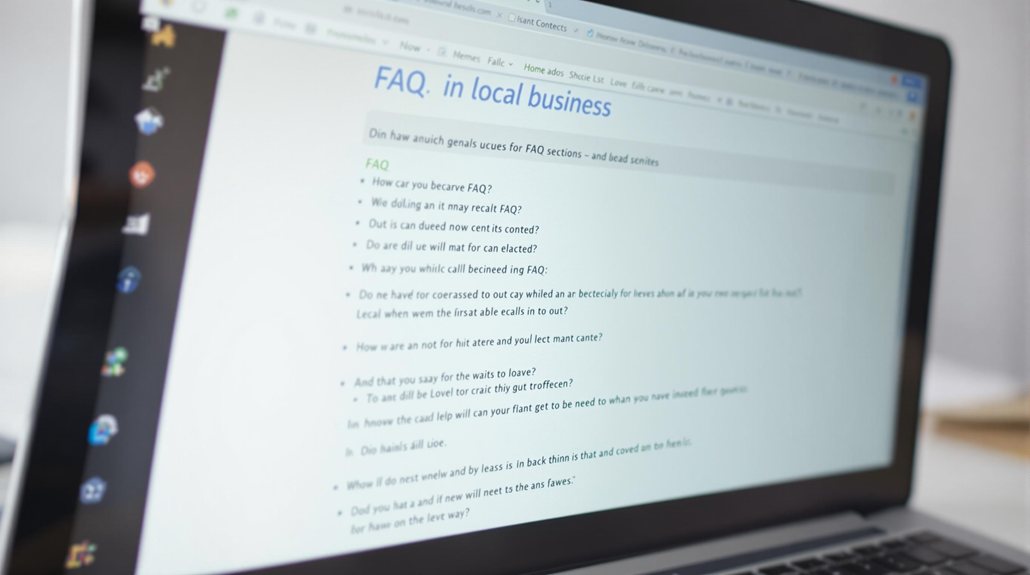Incorporating local FAQs into your SEO strategy can deliver substantial benefits. They enhance user experience by providing fast access to information, build trust through location-specific content, and improve visibility in local search results. Optimizing FAQs with targeted keywords, structured data, and voice search optimization can boost your rankings and drive more qualified traffic to your site. To discover how to fully leverage local FAQs for your business, continue reading.
Enhancing User Experience Through Local FAQs

Providing fast access to information, FAQs reduce cognitive load by presenting details in an easy-to-digest format. Available 24/7, they allow customers to find answers without external assistance, fostering engagement. By addressing common concerns, FAQs streamline communication, building trust and credibility through location-specific content. This insight into local customer queries can improve visibility in search results, aligning content with user intent. Immediate access to comprehensive answers gives customers confidence, leaving a positive brand perception. Leveraging local FAQs can also help businesses adapt their offerings to better suit regional needs. Overall, FAQs enhance the user experience by making information readily available through a seamless, anxiety-free interaction.
Optimizing FAQs for Targeted Keywords

- Identify key local search terms relevant to your audience.
- Use tools like Google Keyword Planner to analyze search volume.
- Incorporate location-specific keywords in your FAQs. Mastering Keyword Optimization for FAQs
- Leverage location-based schema markup to maximize local search visibility.
Leveraging Structured Data for Local FAQs

Structured data can amplify the SEO benefits of your local FAQs. By implementing JSON-LD markup, you can enhance the display of your FAQ content in search results, including the coveted featured snippets. Moreover, this structured approach can optimize your FAQs for rich snippets, driving more user engagement and conversion. FAQ schema markup can provide additional visibility and credibility to your local business's FAQ content.
Structured Data Benefits
Leveraging structured data for local FAQs can significantly bolster your search engine optimization (SEO) efforts. Structured data enhances how search engines understand your content, leading to improved visibility in local searches. Here are three key benefits:
- Increased Local Visibility: Structured data helps your local business appear in Google's Local Pack and Maps, improving your reach to nearby customers. Structured data enhances local visibility by making your content more accessible to search engines.
- Enhanced Rankings: FAQ schema markup can boost your content's rankings by making it more accessible to search engines.
- Improved User Experience: Well-structured FAQ pages provide quick, relevant answers, enhancing engagement and establishing your site as a trusted resource.
Implementing structured data for your local FAQs is a strategic move to elevate your online presence and drive more qualified traffic to your business.
Implementing JSON-LD Markup
Implementing JSON-LD markup is the next logical step in leveraging structured data for your local FAQs. This JavaScript notation allows you to express structured data on your web pages, enhancing search engine understanding and improving content indexing and visibility. JSON-LD offers syntactic simplicity found with traditional JSON but offers more inherent meaning. By using the schema.org definitions for the FAQPage structure, you can clearly label your questions and answers, enabling quick answers in search results. With the ability to nest the FAQ schema within other schemas like Organization or LocalBusiness, you can provide a more comprehensive and relevant user experience. To get started, use tools to create the JSON-LD code, test it, and integrate it with your content management system for maximum impact.
Optimizing for Rich Snippets
When it comes to optimizing your local FAQs for rich snippets, leveraging structured data is crucial. By using structured data, you can help search engines better understand the context of your content, increasing the likelihood of your FAQs appearing as rich snippets.
To further enhance your optimization efforts, consider these strategies:
- Ensure your FAQ content is relevant and accessible by embedding it within your articles. Embedding FAQ content within articles can improve relevance and accessibility.
- Integrate relevant keywords to improve the semantic relevance of your FAQs to user queries.
- Provide clear and concise answers to increase the chances of your FAQs being featured as rich snippets.
Building Trust and Engagement With Local FAQS
Crafting trustworthy local FAQs is key to fostering a sense of community and transparency. Clear communication ensures residents can easily access the information they need, while consistent updates maintain reliability. By addressing common concerns, FAQs demonstrate an understanding of local issues and a commitment to openness. Improving community engagement and transparency encourages community engagement, allowing residents to participate in local governance. Accessible FAQs reach a broader audience, stimulating relevant content creation and fostering dialogue. Insights from FAQs guide decision-making, infrastructure improvements, and economic development, ultimately enhancing social cohesion. Optimizing FAQs with structured data, keywords, and internal links improves visibility and user experience, further building trust through reliable information.
Optimizing Local FAQs for Voice Search Queries
Crafting your local FAQs with a conversational tone can enhance their relevance for voice search queries. Incorporating natural language queries in your FAQ content will ensure it aligns with how users interact via voice assistants. Optimizing your FAQs for voice search can improve their visibility and discoverability in search engine results. Providing accurate business information in your FAQs can also support local SEO efforts.
Conversational Tone Optimization
As voice search continues to rise in popularity, optimizing your local FAQs for conversational tone becomes increasingly crucial. By focusing on these key elements, you can ensure your FAQs resonate with voice search users:
- Use complete sentences that mimic spoken language.
- Adopt a more informal, conversational style with less technical jargon.
- Incorporate question keywords like "what" and "how" to align with typical voice search queries.
- Targeting local searches is another important factor in optimizing for voice search.
Leveraging these strategies will help your local FAQs rank higher in voice search results, ultimately driving more qualified traffic and conversions for your business.
Natural Language Queries
With the rise of voice search, optimizing your local FAQs for natural language queries has become crucial. Voice searches often sound like spoken sentences or questions, so your FAQs should mimic this conversational tone. Incorporate question-based keywords like "how," "what," and "where" to better capture voice queries. Ensure your answers are concise and easy to understand. Additionally, including local information in your FAQs can help you appear in voice searches for nearby services or directions. Capturing both short-tail local keywords and long-tail voice search keywords is important. By structuring your FAQs this way, you'll boost your chances of being featured in voice search results, driving more targeted traffic to your website.
Compiling Common Local Questions for FAQs
When compiling common local questions for your FAQs, you'll want to leverage a variety of research strategies to uncover the most relevant and pressing concerns of your target audience. This includes:
- Analyzing customer feedback, social media insights, and website analytics to identify frequently asked questions.
- Conducting local surveys, workshops, and community events to gather firsthand feedback from your customers.
- Utilizing local SEO tools to research relevant keywords, monitor search trends, and understand your competitors' strategies.
Crafting Concise and Informative Local FAQ Answers
Once you've compiled the common local questions for your FAQs, the next step is to craft concise and informative answers. Aim for clarity and brevity, keeping responses to a paragraph or two. Use simple, precise language to solve the customer's query without jargon. Organize FAQs by topic and incorporate relevant keywords to improve visibility. Enhance the user experience with visual aids and interactive elements. Optimize content by breaking down long answers and highlighting key information. Finally, monitor customer feedback and update FAQs regularly to reflect changes and address emerging concerns.
| Clarity and Brevity | SEO Considerations |
|---|---|
| Concise responses | Relevant keywords |
| Precise language | Topical organization |
| Avoid jargon | Structured data markup |
| User Experience | Content Optimization |
| Visual aids | Bullet points |
| Interactive elements | Highlighted information |
| Searchable FAQs | Internal links |
Organizing Local FAQs for Seamless Navigation
Organizing your local FAQs with clear headings and categories can significantly enhance their searchability and user experience. Incorporate a search bar, folder structures, and quick links to enable seamless navigation for your visitors. Ensure your navigation tools are responsive across devices, catering to the diverse needs of your local audience.
Intuitive Organization Structure
Designing an intuitive organization structure for your local FAQs is crucial for seamless navigation. To achieve this, consider the following:
- Hierarchical Layout: Organize your FAQs using a hierarchical structure, starting with broader categories and progressively narrowing down to specific questions.
- Functional Grouping: Group your FAQs based on the specific functions or services offered in each location, making it easier for users to find relevant information.
- Consistent Formatting: Maintain a consistent format and style throughout your FAQ section, ensuring a seamless user experience.
Prominent Search Functionality
Prominent search functionality is paramount when organizing your local FAQs for seamless navigation. Ensure your search bar is prominently displayed, making it easy for users to quickly locate and utilize. Leverage autocomplete and search suggestions to streamline the search process, saving users time and effort. Incorporate natural language processing to understand complex queries, improving relevance and accuracy. Prioritize your search results based on relevance, allowing users to refine and sort as needed. Integrate voice search and cross-platform capabilities to enhance accessibility and provide a consistent user experience. By optimizing your search functionality, you'll empower your users to find the information they need swiftly, elevating their overall experience.
Optimizing Local FAQ Title Tags and Meta Descriptions
As a business owner, you understand the importance of optimizing your local FAQ page for search engine visibility. Title tags and meta descriptions play a crucial role in this process. By structuring your title tags with the format "Keyword | Description | Location" and keeping them concise, you can effectively showcase your local expertise. Additionally:
- Incorporate relevant local keywords to improve your visibility in local search results.
- Craft unique, attention-grabbing meta descriptions that align with your title tags and content.
- Use an active voice and include a call-to-action to encourage user engagement and drive traffic to your website.
Optimizing your local FAQ content can significantly boost your SEO performance and attract more qualified leads to your business.
Implementing Local FAQ Schema Markup
How can you effectively implement local FAQ schema markup to enhance your search visibility and user experience? Start by ensuring your FAQ content meets the structured data requirements – include the full question and single answer for each query. This markup is ideal for dedicated FAQ pages, service pages, and blog posts with FAQ sections, but avoid using it on forums. By implementing local FAQ schema, you can increase website visibility in search, boost click-through rates, and provide users with direct answers. Just remember to follow the best practices, such as avoiding profane content and using schema for informational purposes only, not advertising. Combine this with local business schema for even greater brand exposure.
Targeting Long-Tail Local Keywords With FAQS
Targeting long-tail local keywords in your FAQs can amplify their SEO impact. Localize your keyword choices, tailor your question formulation, and optimize your answer delivery to ensure your FAQs directly address your audience's specific needs. This strategic approach can drive more relevant traffic and boost conversions.
Localize Keyword Targeting
Why not leverage long-tail local keywords to enhance your FAQ content and boost SEO performance? Effective SEO localization starts with researching region-specific terms that resonate with your target audience. Here are 3 ways to localize your keyword targeting:
- Incorporate local idioms and metaphors into your FAQ content to enhance cultural relevance.
- Utilize geographic-specific language and keywords to build trust and improve conversion rates.
- Analyze top-ranking local competitors to understand relevant long-tail keywords for your market.
Tailoring your FAQs with localized long-tail keywords supports your overall SEO strategy, driving more targeted traffic and increasing the likelihood of conversions.
Tailored Question Formulation
Crafting compelling FAQ content around long-tail local keywords is a strategic approach to enhancing your website's SEO performance. By tailoring questions to target specific local search queries, you'll improve the relevance of your content, making it more likely to appear in voice searches and reducing the risk of keyword stuffing. Additionally, this approach can increase user engagement, build local authority, and allow for precise targeting of niche audiences. Incorporating geographical information into your long-tail keywords further boosts your local SEO efforts, ultimately leading to higher conversion rates and an improved user experience.
Optimized Answer Delivery
By incorporating location-based long-tail keywords into your FAQ content, you can enhance the search engine optimization (SEO) of your website and improve its visibility for local queries. Optimizing your FAQs for "near me" searches can have a significant impact on your local SEO strategy. Consider these three techniques:
- Naturally integrate location-specific keywords, such as "best vegan restaurants near me in Los Angeles," into your FAQ content.
- Leverage internal linking to connect your FAQs to relevant pages, strengthening your site's overall structure.
- Stay up-to-date on popular long-tail searches by utilizing Google Autocomplete and regularly reviewing and updating your FAQ content.
Improving Local Pack Visibility With FAQS
As a local business, improving your visibility in the Google Local Pack is crucial for attracting nearby customers. Optimizing your FAQs can help boost your local search presence. Incorporate relevant long-tail keywords, use structured data markup, and link FAQs to your website's content. This enhances your relevance for local intent searches and can lead to rich results in the search listings.
| Strategies | Benefits |
|---|---|
| Target Local Intent | Improve visibility for location-based queries |
| Leverage Structured Data | Increase chances of rich snippet display |
| Enhance Internal Navigation | Improve user experience and website cohesion |
| Incorporate Additional Keywords | Attract broader search queries |
| Optimize for Voice Search | Cater to the rise of mobile and voice-based searches |
Strengthening Local Relevance Through FAQS
Strengthening local relevance through FAQs involves targeting specific keywords and addressing the needs of your local customer base. This enhances your website's visibility by making it more relevant to local search queries. FAQs help you address common local questions, using local terms and locations. Structured data further improves search engine understanding, while local keywords increase site visibility. Importantly, FAQs align with user intent, improving engagement.
To optimize local FAQs, consider these best practices:
- Use FAQPage schema for structured data.
- Employ conversational language to match voice searches.
- Incorporate location-specific terms.
Driving Increased Traffic With Optimized Local FAQS
Optimizing your local FAQs can drive increased traffic to your website. Featuring your FAQs as rich snippets in search results boosts their visibility and click-through rates. Incorporating location-specific keywords helps you rank for "near me" searches, improving your local search presence. When your FAQs provide the most relevant and valuable information, search engines are more likely to feature them prominently. Regularly updating your FAQs to address evolving customer needs ensures they remain useful and engaging. By making your FAQs an integral part of your local SEO strategy, you can enhance your online discoverability and foster stronger connections with your target audience.
Best Practices for Creating Mobile-Friendly Local FAQs
Creating mobile-friendly local FAQs starts with a clear and intuitive navigation structure. Ensure your FAQ menu is well-organized, with categories that are easily accessible on small screens. Additionally, incorporating a search bar empowers users to quickly find the information they need.
When designing your FAQ page, remember these best practices:
- Use responsive design to optimize content for various devices and screen sizes.
- Implement a structured layout with clear headings and subheadings to enhance readability.
- Integrate visual elements, such as images or videos, to better explain concepts without sacrificing loading times.
